初中英语人教版新目标英语七年级(下)
人教版(新目标)初中英语七年级下册Unit 2预习自学

Unit 2单词(音标)up [ ʌp] adv. 向上get up 起床;站起dress [ dres] v. 穿衣服 n. 连衣裙getdressed 穿上衣服brush [ brʌʃ] v. 刷刷净 n. 刷子tooth [ tuːθ] n. ( pl. teeth[ tiːθ]) 牙齿shower [ ' ʃaʊə]n.& v.淋浴n. 淋浴器(间)take a shower 洗淋浴usually [ ' ju: ʒuəli] adv. 通常地;一般地forty [ ' fɔ:( r) ti] num. 四十wow [ waʊ] interj.(表示惊奇或敬佩)哇;呀never [ ' nevə( r)] adv. 从不;绝不early [ ' ɜːlɪ]adv.& adj. 早(的)f i fty [ ' f ɪ ftɪ]num. 五十job [ dʒɒb], [ dʒɑːb] n. 工作;职业work [ wɜːk] v. & n. 工作station [ ' steɪʃn] n. 电( 视) 台;车站radio station 广播电台o' clock [ ə' klɒk], [ ə' klɑ: k] adv.(表示整点)…… 点钟night [ naɪt] n. 晚上;夜晚funny [ ' fʌnɪ] adj. 奇怪的;滑稽好笑的exercise [ ' eksəsaɪz]v.& n. 锻炼;练习on weekends ( 在) 周末best [ best] adj. 最好的 adv. 最好地;最group [ gruːp] n. 组;群half [ hɑːf], [ hæf] n. & pron. 一半;半数past [ pɑːst],[ pæst]prep. 晚于;过(时间) adj. 过去的quarter [ ' kwɔː( r) tə( r)]n. 一刻钟;四分之一homework[' həʊmwɜː( r) k] n. 家庭作业do( one’ s) homework 做作业run [ rʌn] v. 跑;奔clean [ kliːn]v. 打扫;弄干净 adj. 干净的walk [ wɔːk]n.& v. 行走;步行take a walk 散步;走一走quickly [ ' kwɪkli] adv. 很快地either [ ' aɪðə( r)], [ ' iː ðə( r) ] adv. 或者;也(用在否定词组后)either… or…要么……要么……;或者……或者……lot [ lɒt], [ lɑ: t] pron. 大量;许多lots of 大量;许多sometimes [ ' sʌmtaɪmz] adv. 有时taste [ teɪst]v. 有……的味道;品尝 n. 味道;滋味li fe [ laɪf]n. 生活;生命Rick [ rɪk] 里克(男名)Jim [ dʒɪm] 吉姆(男名)Scott [ skɒt], [ skɑ: t] 斯科特(男名)Tony [ ' təʊnɪ] 托尼(男名)unit2电子课本Liaten and match the timea with the actions. Draw lines from the clocksto the pictures.Snident A ie the interviewer. Student B is Rick. Ask amd axxswerquestions about Rick's day.A: V 'ha c t tim dci yo u usually take a s lioive r, Rick * B : 1 us my take a sh never aI s ix fo rty.Match theactivi£ics wiEts tJze pictures.1. ,lot up c?. gn tn sChnnlri t si x i hi r r yWhos tiry›c dg ypuusmlly get up7Jim hassisters. Jim’s familyhas _ xhuxvcr.Ltccers agaJxs. Cossp!ete tbe shower schedcsle £orJiza*c fiuoJ3y'.Tims5:3¢linterviewer: -$cott has an inrcrext ing jrib. He wcirks at a radiri station.Scott, what time is your radio show?Ston: Interviewer: Scott:From bvelve o’clock at night to six oklock in the morning. What time do you usually get up?At eight thirty at night. ”thenI eat breakfast at nine.Interviewer: ‘Heat s a ftnftf¥y titTte fOr t›renkfast!S‹ort:Scoti:Yeah. After that, I usually exercise at a1›nut ten twenty. then do you go to «'ork?At 4•levcn t3’clock, .*cl I 'mnever late for work.tøte on •<cłændsüh< țjr î3 uc u14.Anna never eats breakfast.S. What rime does your be3t Friend go to sckooł7When do students usually do these things? h4atchthe activitie.s tenth the time of day..i .jiiartcr i‹› ten ii* ila.Check your answers with your partner.sListen rind circle the activities yuu hear.g= =p 5: 30.1. eat \ realm:1st 4. ¿u tu choul. in hnmc7. clcan i riy rel t3It1G. eat ‹4in n er9. t.Ake a is' all 1 O. t;ci ter b c dListen agatn. Wrtte Mtc titres text to tbe actioicies yotz circled In 1 c.AkandanswerquesConsaboutlom. ’Unit2 知识梳理◆短语归纳1.what time 几点2.go to school 去上学3.get up 起床4.take a shower 洗淋浴5.brush teeth 刷牙6.get to 到达7.do homework 做家庭作业8.go to work 去上班9.go home 回家10.eat breakfast 吃早饭11.get dressed 穿上衣服12.get home 到家13.either…or…要么…要么…14.go to bed 上床睡觉15.in the morning/afternoon/evening 在上午/下午/晚上16.take a walk 散步17.lots of=a lot of 许多,大量18.radio station 广播电台19.at night 在晚上20.be late for=arrive late for 迟到◆用法集萃1.at + 具体时间点在几点(几分)2.eat breakfast/lunch/dinner 吃早饭/午饭/晚饭3.thirty/half past +基数词…点半4.fifteen/a quarter to +基数词差一刻到…点5.take a/an+名词从事…活动6.from…to…从…到…7.need to do sth 需要做某事◆典句必背1.—What time do you usually get up? 你通常几点钟起床?—I usually get up at six thirty. 我通常6:30起床。
人教版(新目标)初中英语七年级下册Unit11预习自学
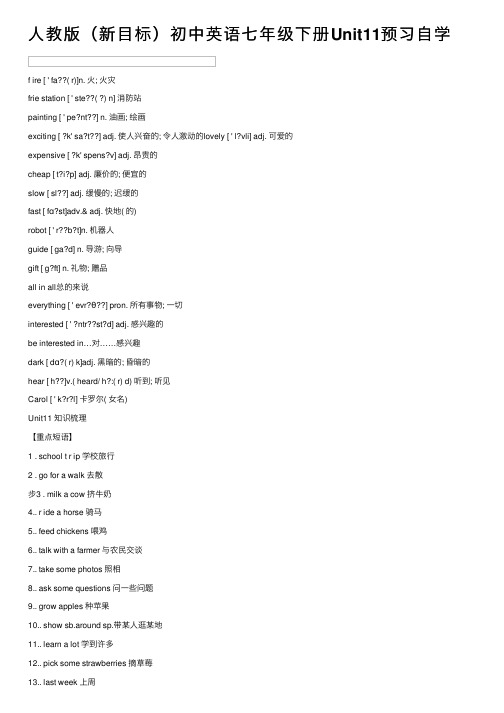
⼈教版(新⽬标)初中英语七年级下册Unit11预习⾃学f ire [ ' fa??( r)]n. ⽕; ⽕灾frie station [ ' ste??( ?) n] 消防站painting [ ' pe?nt??] n. 油画; 绘画exciting [ ?k' sa?t??] adj. 使⼈兴奋的; 令⼈激动的lovely [ ' l?vli] adj. 可爱的expensive [ ?k' spens?v] adj. 昂贵的cheap [ t?i?p] adj. 廉价的; 便宜的slow [ sl??] adj. 缓慢的; 迟缓的fast [ fɑ?st]adv.& adj. 快地( 的)robot [ ' r??b?t]n. 机器⼈guide [ ga?d] n. 导游; 向导gift [ g?ft] n. 礼物; 赠品all in all总的来说everything [ ' evr?θ??] pron. 所有事物; ⼀切interested [ ' ?ntr??st?d] adj. 感兴趣的be interested in…对……感兴趣dark [ dɑ?( r) k]adj. ⿊暗的; 昏暗的hear [ h??]v.( heard/ h?:( r) d) 听到; 听见Carol [ ' k?r?l] 卡罗尔( ⼥名)Unit11 知识梳理【重点短语】1 . school t r ip 学校旅⾏2 . go for a walk 去散步3 . milk a cow 挤⽜奶4.. r ide a horse 骑马5.. feed chickens 喂鸡6.. talk with a farmer 与农民交谈7.. take some photos 照相8.. ask some questions 问⼀些问题9.. grow apples 种苹果10.. show sb.around sp.带某⼈逛某地11.. learn a lot 学到许多12.. pick some strawberries 摘草莓13.. last week 上周14..In the countryside 在乡村15.. visit my grandparents 拜访我的祖⽗母16.. go f ishing 去钓鱼17.. sound good 听起来很好18.. climb the mountains 去爬⼭19 . play some games 玩⼀些游戏20 . visit a museum 参观博物馆21 .visit a f i re station 参观消防站22 . draw pictures 画画23 . go on a school t r ip 去旅⾏24 visit the science museum 参观科技博物馆25.. how to make a model robot 如何制作机器⼈模型26.. gift shop 礼品店27.. buy sth.for sb. = buy sb.sth. 为某⼈买某物28 .all in all 总得来说29 .be interested in...对… 感兴趣30 .be expensive 昂贵的31 .not. . . at all ⼀点⼉也不【重点句型】1 . --- Did you see any cows? 你见到奶⽜了吗--- Yes,I did.I saw quite a lot.我见到了⽽且见到了很多很多2.. --- Did Carol take any photos?罗尔拍照⽚了吗?--- Yes, she did. 是的,她拍了。
新目标(人教)七年级下册英语教学课件 Unit 3 Section A(2a-2e)

Jane: About 15 minutes by bike. It’s good exercise.
/baɪ/ prep. (表示方式)乘(交通工具)
Lisa: Yeah. Well, have a good day at school.
Jane: You, too.
by bike member.
walks
about 20 minutes
takes the bus about one hour and 30 minutes
How far? (kilometers)
about 2 kilometers
about 60 kilometers
2c Listen again. Check your answers in 2b.
Work in groups of four and do a research about others’ transportation, the amount of time and distance to school.
Who How How long
How far
Lily on foot ten minutes one kilometer
这里用作名词, 意为“旅程”。
Lisa: I’m not sure ... about 10 kilometers? The bus ride
takes about 20 minutes. How long does it take you
to get to school?
动词, 意为“花费 (时间)”。
Conversation 1 Mary: How do you get home from school, Tom? Tom: I walk. Mary: How long does it take? Tom: It takes about 20 minutes. Mary: Wow! That’s quick! How far is it from the school to your home? Tom: Only about two kilometers.
初中英语人教新目标七年级下册Unit10词汇专项练习(附参考答案)

七年级英语下册Unit10词汇练习班级考号姓名总分【SectionA】一、根据句意和中文提示写单词。
1.Today's (特色菜)is chickensoup.2.We have (羊肉)noodles.3.I like eating (卷心菜)very much.4.I'm a little hungry.I'd like a (大的) bowl of noodles.5.There are two bowls of (米饭)on the table.6.People in England like eating (土豆)a lot.二、根据句意和首字母提示写单词。
1.I'd like some noodles with c and potatoes.2.China is a l country with a long history.3.There are all k of animals in the zoo.4.- What s do you want? - Large.5.We can get b and milk from cows.三、用括号中所给单词的适当形式填空。
1.She eats (tomato) every day.2.We'd like (go) out for a walk.3.Beef noodles and tomato soup are their (special).4.-What (will) you like?-Apples.5.They'd like three bowls of mutton and (potato) noodles.1.Chinese is very delicious.2.He'd like a smal lof noodles.3.- Would you like the one or the small one?- The small one.4.-May I take a(n) ?- Sure.5.- What would you like?- A medium bowl is OK.五、单项选择。
初中英语人教新目标七年级下册 Unit 1基础知识练习题(附参考答案)
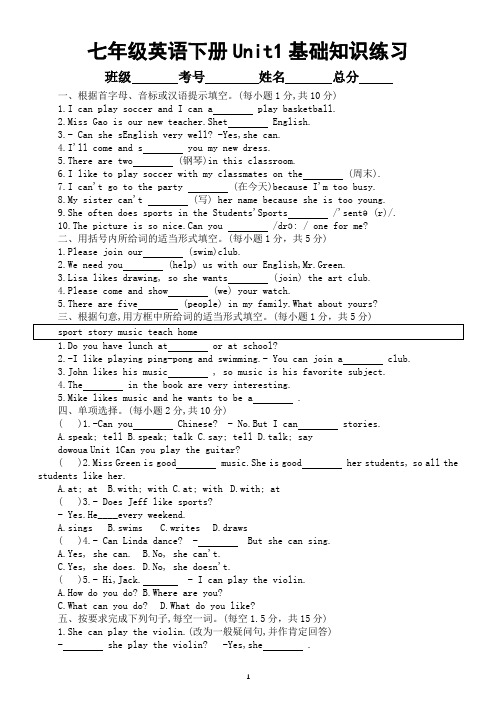
七年级英语下册Unit1基础知识练习班级考号姓名总分一、根据首字母、音标或汉语提示填空。
(每小题1分,共10分)1.I can play soccer and I can a play basketball.2.Miss Gao is our new teacher.Shet English.3.- Can she sEnglish very well? -Yes,she can.4.I'll come and s you my new dress.5.There are two (钢琴)in this classroom.6.I like to play soccer with my classmates on the (周末).7.I can't go to the party (在今天)because I'm too busy.8.My sister can't (写) her name because she is too young.9.She often does sports in the Students'Sports /'sentə (r)/.10.The picture is so nice.Can you /dr二、用括号内所给词的适当形式填空。
(每小题11.Please join our (swim)club.2.We need you (help) us with our English,Mr.Green.3.Lisa likes drawing, so she wants (join) the art club.4.Please come and show (we) your watch.5.There are five (people) in my family.What about yours?1.Do you have lunch at or at school?2.-I like playing ping-pong and swimming.- You can join a club.3.John likes his music , so music is his favorite subject.4.The in the book are very interesting.5.Mike likes music and he wants to be a .四、单项选择。
人教版(新目标)初中英语七年级下册Unit 4预习自学
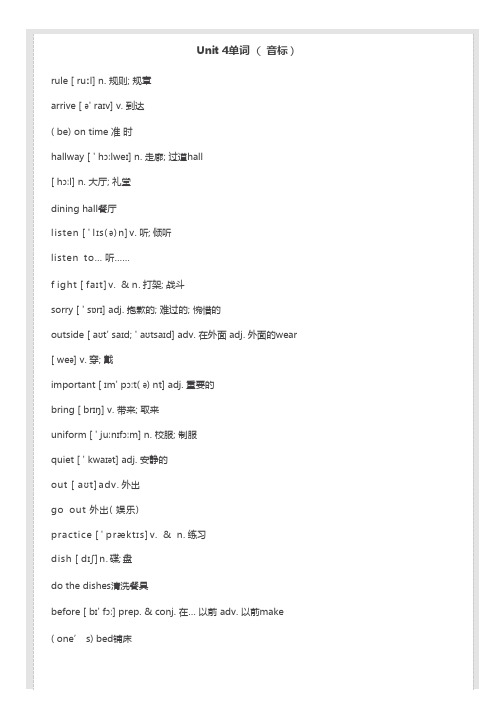
Unit 4单词(音标)rule [ ruːl] n. 规则; 规章arrive [ ə' raɪv] v. 到达( be) on time 准时hallway [ ' hɔːlweɪ] n. 走廊; 过道hall[ hɔːl] n. 大厅; 礼堂dining hall餐厅l isten [ ' l ɪs( ə) n] v. 听; 倾听l i sten to… 听……f ight [ faɪt] v.& n. 打架; 战斗sorry [ ' sɒrɪ] adj. 抱歉的; 难过的; 惋惜的outside [ aʊt' saɪd; ' aʊtsaɪd] adv. 在外面 adj. 外面的wear [ weə] v. 穿; 戴important [ ɪm' pɔːt( ə) nt] adj. 重要的bring [ brɪŋ] v. 带来; 取来uniform [ ' juːnɪfɔːm] n. 校服; 制服quiet [ ' kwaɪət] adj. 安静的out [ aʊt] adv. 外出go out 外出( 娱乐)practice [ ' præktɪs] v.& n. 练习dish [ dɪʃ] n. 碟; 盘do the dishes清洗餐具before [ bɪ' fɔː] prep. & conj. 在… 以前 adv. 以前make ( one’ s) bed铺床dirty [ ' dɜːtɪ] adj. 脏的kitchen [ ' kɪtʃɪn] n. 厨房more [ mɔː] adj. & pron. 更多的noisy [ ' nɒɪzɪ] adj. 吵闹的relax [ rɪ' læks] v. 放松; 休息read [ riːd] v. 读; 阅读terrible [ ' terɪb( ə) l ] adj. 非常讨厌的; 可怕的feel [ f iːl] v. 感受; 觉的strict [ strɪkt] adj. 严格的; 严厉的be strict ( with sb)( 对某人) 要求严格remember [ rɪ' membə]v. 记住; 记起follow [ ' fɒləʊ] v. 遵循; 跟随follow the rules遵守规则luck [ lʌk]n. 幸运; 运气keep [ kiːp] v. 保持; 保留hair [ heə] n. 头发; 毛发learn [ lɜːn] v. 学习; 学会Clark [ kla: k] 克拉克( 姓; 男名)Amy [ eɪmɪ] 埃米( 女名)Molly[' mɒlɪ] 莫莉( 女名)New York [ nju: jɔ: k] 纽约unit4课本教材Listezz. What rules axe chese xt«dents breaking? Write the zsuznbera aAcr tbe names.Peter Amy MikeStudent A in a new stude»n Stud B ent A: What arc the ml es?tella Student A about the rulea above. *' We 1, ^* *^" * •••'*° la*c f°rclass. ¥S'e must tie on Anne.Listen. Cbeck { ) tJze acttvttJes AMxt azzd Ctaéy taJJ¢ahout.Activity1.«•'*listen to music tn theclassroom or hallways2.listen to music in thecan can’tITIUSIC fOOIYI3. listen to music outside can can't4. eat in the classroom Caf›can t5. eat in the dininghall can can't6. eatoutside can can't7. wearahat can can’t8. fight can can’ttbese activities? Ctrct ” core or czzsf*¢aboveStudozzt A is Alaa aad Studezst B 1sCfncfp. Talk about che Mes in 2a.Role-play ghe corsveruagioxx.John: I li, my names Jo hn. It's my first day at school.dlice: Hi, John. I’m Alice. ’I liix is a great schocil, but there are a lot of rules. John:Really?that are some of the rules°Alice: ¥$'c11, dun‘t be late f‹ir cla.ss. This is very important.John: OK, so we tz ust be a»time. lan we bring music gIay«rv to schuo1? Alice: No, we can’t. And we always have to «'ear the school uniform.John: 1 see.Alice: Oh, and we atso hax•e to be quiet in the library.t«emeeeez«c nD n'(e [j)'j [ $ c s cc •••v•« v « o« cc « n c n » » c c c c c n c nc nm m+ #§# #m«+++«***.Don’t run in th/èhallways.What are the rules.+Carl we eat in the c lassroomCari we wear a hat in c lass*Does he have to wear a uniform at school ? What do. you have to dokWrite khe rules for the school l ibrary.Don’t light.We’ must be ön time for class. No. we can‘1, büt. we cän eaïin the dining hall.\ës, we can./No. we can't.Y es. he does./No. he doesn*t.We have to be quièt.in the libraiy,Usethewords to make qucstionx about the rules. then x••rite nnswers 0Does she have to be quiet ‹n †he library* (3he/bve to,’ü› d c ÏiL›rary)? A: Y . shs does.A:1istrn to music *(we/c.an lin the h.allivays) *0.Make up five cool rules for your dream whoril. Share your rules with the claas. Y•sur clm*smates vote for the Cwoleet School?l . \Ve can cut in class. ,2. 't¥'e doii’t lIax c-c te truc te› schunl every da)v-.Read the z•uIes in the chazt En 1b. Neo azaccb cbeRulex Can’t(')a . gu uutse+' friendsda his nomew'Orkp actice the quitar‹!o thee disheswatr.h TVhe p h:'s mom make bleak tart ash s oo x on school nigh†sE,lsten agatn. Write wlzeo Dave Rae to /oIfow Ebe cuJea isz the chart In 1b. Cboose fñoczs tbc pkxases tza thee boz.on schonl nights every Saturday befc re dinner in lhe evening rin schc›nl days.after dinner after school every m orningTallc ahozst the x"nIes to Daea'é botzac.Unit4 知识梳理◆短语归纳1.on time 准时,按时2.listen to… 听……3.in class 在课上4.be late for 做……迟到5.have to 不得不6.be quiet 安静7.go out 外出8.do the dishes 清洗餐具9.make breakfast 做早饭10.make (one’s) bed 铺床11.be noisy 吵闹12.keep one’s hair short 留短发13.play with sb. 和某人一起玩14.play the piano 弹钢琴15.have fun 玩得高兴16.make rules 制订规则◆用法集萃1.Don’t + 动词原形+其他。
人教版新目标 初中英语 七年级英语下册说课稿
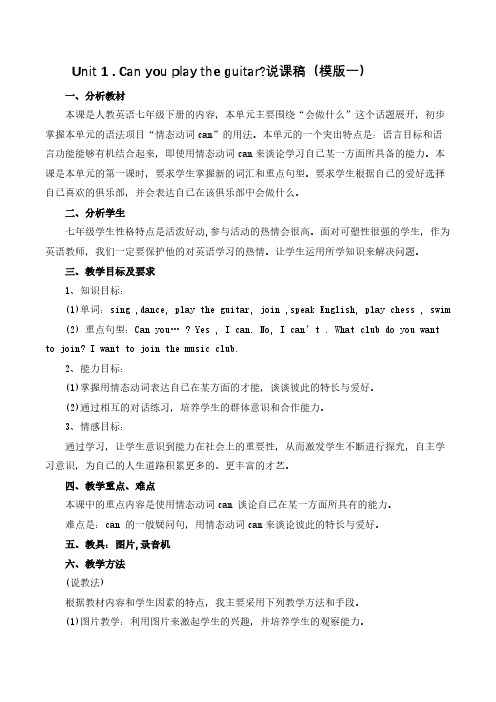
一、说教材 1.教材分析 本单元的核心教学内容是“谈论自己在某方面所具有的能力”(Talking about abilities),整个单元的内容都是围绕情态动词 can 展开的。通过本单元的学习,使学生能 够运用情态动词 can 表达自己某一方面所具有的才能,谈论自己的喜好与意愿,能自荐或参 加各种课外俱乐部,并制作海报而且学会写出招聘广告。并让学生在实践中学会和使用目标 语,鼓励学生积极参加稳中有降种课外各种文体活动,培养学生的多方面才华及团队精神。 而本课是这一单元的第一课时,通过对本节课词汇和句型的学习,学生能够运用所学知识去 表达他们能做些什么,并能开展为参加兴趣小组的调查活动,通过以上活动的开展为后面的
一、分析教材 本课是人教英语七年级下册的内容,本单元主要围绕“会做什么”这个话题展开,初步 掌握本单元的语法项目“情态动词 can”的用法。本单元的一个突出特点是:语言目标和语 言功能能够有机结合起来,即使用情态动词 can 来谈论学习自己某一方面所具备的能力。本 课是本单元的第一课时,要求学生掌握新的词汇和重点句型。要求学生根据自己的爱好选择 自己喜欢的俱乐部,并会表达自己在该俱乐部中会做什么。 二、分析学生 七年级学生性格特点是活泼好动,参与活动的热情会很高。面对可塑性很强的学生,作为 英语教师,我们一定要保护他的对英语学习的热情。让学生运用所学知识来解决问题。 三、教学目标及要求 1、知识目标: (1)单词:sing ,dance, play the guitar, join ,speak English, play chess , swim (2) 重点句型:Can you… ? Yes , I can. No, I can’t . What club do you want to join? I want to join the music club. 2、能力目标: (1)掌握用情态动词表达自己在某方面的才能,谈谈彼此的特长与爱好。 (2)通过相互的对话练习,培养学生的群体意识和合作能力。 3、情感目标: 通过学习,让学生意识到能力在社会上的重要性,从而激发学生不断进行探究,自主学 习意识,为自己的人生道路积累更多的、更丰富的才艺。 四、教学重点、难点 本课中的重点内容是使用情态动词 can 谈论自己在某一方面所具有的能力。 难点是:can 的一般疑问句,用情态动词 can 来谈论彼此的特长与爱好。 五、教具:图片,录音机 六、教学方法 (说教法) 根据教材内容和学生因素的特点,我主要采用下列教学方法和手段。 (1)图片教学:利用图片来激起学生的兴趣,并培养学生的观察能力。
初中英语人教新目标七年级下册Unit 1 默写知识练习(附参考答案)
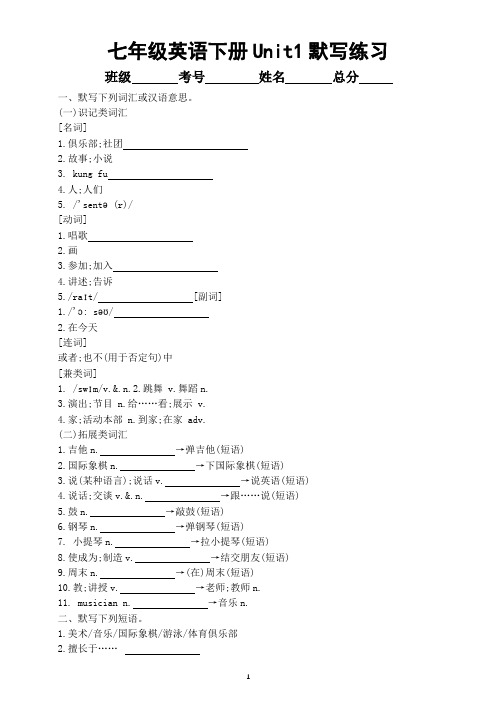
七年级英语下册Unit1默写练习班级考号姓名总分一、默写下列词汇或汉语意思。
(一)识记类词汇[名词]1.俱乐部;社团2.故事;小说3. kung fu4.人;人们5. /'sentə (r)/[动词]1.唱歌2.画3.参加;加入4.讲述;告诉5./raɪt/ [副词]1./'ɔ: səʊ/2.在今天[连词]或者;也不(用于否定句)中[兼类词]1. /swɪm/v.&.n.2.跳舞 v.舞蹈n.3.演出;节目 n.给……看;展示 v.4.家;活动本部 n.到家;在家 adv.(二)拓展类词汇1.吉他n. →弹吉他(短语)2.国际象棋n. →下国际象棋(短语)3.说(某种语言);说话v. →说英语(短语)4.说话;交谈v.&.n. →跟……说(短语)5.鼓n. →敲鼓(短语)6.钢琴n. →弹钢琴(短语)7. 小提琴n. →拉小提琴(短语)8.使成为;制造v. →结交朋友(短语)9.周末n. →(在)周末(短语)10.教;讲授v. →老师;教师n.11. musician n. →音乐n.二、默写下列短语。
1.美术/音乐/国际象棋/游泳/体育俱乐部2.擅长于……3.打篮球/网球/排球4.写故事5.学校文艺表演6.放学后7.在音乐室8.练(中国)功夫9.和……玩游戏10.需要某人做某事11.在某方面帮助(某人)12.学生体育中心13.老人之家14.善于应付……的;对……有办法三、根据汉语提示完成下列句子。
1. 我想参加美术社团。
I the art club.2.“你会游泳吗?”“不,我不会。
”- you ?- , .3.你想加入什么俱乐部?-4.我们要为学校文艺表演招募学生。
We students for the .5.你会唱歌或跳舞吗?- ?6. 请放学后和张老师谈一谈。
Please Mr.Zhang .7.来展示给我们看看! !8.我会说英语,并且我也会踢足球。
I English and I .9.我喜欢和人们交谈以及和他们玩游戏。
初中英语人教新目标七年级下册期中考点归纳(1-6单元)

七年级英语下册期中考点归纳Unit 1 Can you play the guitar? 【短语归纳】1.play chess 下国际象棋2.play the guitar 弹吉他3.speak English 说英语4.English club 英语俱乐部5.talk to 跟…说6.play the violin 拉小提琴7.play the piano 弹钢琴8.play the drums 敲鼓9.make friends 结交朋友10.do kung fu 练 (中国) 功夫11.tell stories 讲故事12.play games 做游戏13.on the weekend/on weekends 在周末【用法】1.play +棋类/球类下……棋,打……球2.play the +西洋乐器弹/拉……乐器3.be good at doing sth.= do well in doing sth.擅长做某事4.be good with sb.和某人相处地好5.need sb.to do sth.需要某人做某事6.can + 动词原形能/会做某事7.a little + 不可数名词一点儿……8.join the …club 加入…俱乐部9.like to do sth.=love to do sth. 喜欢/喜爱做某事Unit 2 What time do you go to school? 【短语归纳】1.what time 几点2.go to school 去上学3.get up 起床4.take a shower 洗淋浴5.brush teeth 刷牙6.get to 到达7.do homework 做家庭作业8.go to work 去上班9.go home 回家10.eat breakfast 吃早饭11.get dressed 穿上衣服12.get home 到家13.either…or…要么…要么…14.go to bed 上床睡觉15.in the morning/ afternoon/ evening 在上午/下午/晚上16.take a walk 散步17.lots of=a lot of 许多,大量18.radio station 广播电台19.at night 在晚上20.be late for=arrive late for 迟到【用法】1.at + 具体时间点,在几点(几分)12.eat breakfast/ lunch/dinner 吃早饭/午饭/晚饭3.thirty\half past +基数词……点半4.fifteen\a quarter to +基数词差一刻到……点5.take a/an +名词从事……活动6.from …to …从……到……7.need to do sthUnit 3 How do you get to school? 【短语归纳】1.get to school 到达学校2.take the subway 乘地铁3.ride a bike 骑自行车4.how far 多远5.from home to school 从家到学校6.every day 每天7.take the bus 乘公共汽车8.by bike 骑自行车9.bus stop 公共汽车站10.think of 认为11.between … and …在…和…之间12.one 11-year-old boy 一个11岁的男孩13.play with …和…玩e true 实现15.have to 不得不【用法】1.take… to …= go to … by…乘…去…2.How do / does (sb)get to …? …是怎样到…的?3.How far is it from … to …? 从…到…有多远?4.It takes sb.some time to do sth. 做某事花费某人多长时间。
初中英语人教新目标七年级下册Unit9词汇专项练习(附参考答案)

七年级英语下册Unit9词汇练习班级考号姓名总分【SectionA】一、根据句意和中文提示写单词。
1.I'm going to meet my friends (今晚).2.Do you often go to the (电影院) on weekends?3.(镇江中考)Of all the (女演员),I admire Audrey Hepburn most.4.Mark's brother is very (英俊的).5.I don't know the (演员).He may be a visitor.二、根据句意和首字母提示写单词。
1.-Lucy doesn't have curly hair.- That's right.She has s hair.2.-What does Amy look !?-She is of medium build.3.It is reported that the h of MountQomolangma is about 8848.86 meters.4.(杭州中考)After finishing university,Tomcame to China.Three years l _,he was able to speak good Chinese.三、用括号中所给单词的适当形式填空。
1.(临沂兰陵期末)She is my favorite (act) in China.2.My son ( have) short straight hair.3.My new friend always (wear) a blue shirt.4.If you want to know more about Europe,I'll tell you about it (late),- No,he is .2.-What does our new teacher look like?-She is of build.She has curly hair.3.There's a new movie in the .Let's go to watch it tonight.4.- Are you free today?- No.I'm busy.5.Lily is of medium .五、单项选择。
人教版新目标初中英语七年级下册全套教案

Unit 1 Where’s your pen pal from?一、单元教材分析本单元的中心话题是pen pals。
主要语言功能项目是talk about countries, cities and languages。
语法结构为Where…from; Where…live and what language…speak。
先以Activity1复习语言与国家的配对练习入手,Activity2a, 2b一个综合的听力训练来展示学生的听力能力,并以听力内容为基础,通过Activity2c中假设的两人对话操练来培养学生的交流能力,同时也引导学生多沟通与多交流。
Activity3a是一篇email形式的阅读文章,并有相关问题由学生在阅读后进行回答Activity3b 是根据提供的信息进行填空的写作练习,Activity3c 是一篇模仿写作,让学生给自己的笔友写一封关于本人信息的email。
我在各课时教学中设计各种各样的小活动,通过Discussion,Classifying,Guessing等不同方式让学生掌握本单元的知识点,用学会的知识与外国的笔友自如的交谈是学习本单元的目的。
二、教学目标分析1、语言目标a. 重点词汇:Countries: Canada, China, France, Japan, the United States, Singapore, Australia,The United Kingdom, Paris.Cities: Sydney, New York, Toronto, Toyo, LondonLanguages: English, French, Japanese, Chinese.b. 重点句型:-Where…from? -She’s/He’s from…-Where does…live? -She/He lives in …-What language does she /he speak? -She/He speaks ….2、能力目标a. 培养学生在文段中寻找信息的能力;b. 学会用英文给笔友写回信,简单介绍个人情况;c. 通过有效地小组合作,培养学生合作能力及团队精神。
Unit+6+Section+A课件+2023-2024学年初中英语人教版新目标七年级下册

二、句子速译 1.我们明天晚上见吧! Let’s _m_e_e_t_ _t_o_m_o_r_r_o_w_evening! 2.现在你想去看电影吗? Do you want __t_o__go ___t_o__ _t_h_e___ m_o_v_i_e_s__now?
3.你在做汤吗? Are you m_a_k_i_n_g_ __s_o_u_p__? 4.他在看电视吗? Is he w_a_t_c_h_i_n_g __T_V__? 5.我爸爸没有在读书,但是他在看报。 My father i_s_n_’__t___ r_e_a_d_i_n_g_books, but __h_e__ _i_s__ __r_e_a_d_i_n_g__a newspaper.
2.翻译。 (1)你在做什么? _W_h_a_t_’__r_e__y_o_u__d_o_i_n_g_?_________
(2)她在洗衣服。 _S_h_e_’__s__w_a_s_h_i_n_g__h_e_r__c_l_o_t_h_e_s_._
(3)你在做作业吗? _A_r_e__y_o_u__d_o_i_n_g__y_o_u_r__h_o_m_e_w_o_r_k_?_
三、想一想 此刻你的家人分别都在干什么? 你能用英语写下来吗? 1. _I__a_m__d_o_i_n_g__m_y__h_o_m_e_w_o_r_k_.__________
2. _M_y__f_a_t_h_e_r__i_s__r_e_a_d_i_n_g__a__n_e_w_s_p_a_p_e_r_.
★现在进行时态的句式:
句式
结构
肯定句
主语+ be动词+ 现在分词 + 其他。
主语+ be动词 + not + 否定句
人教新目标初中英语七年级下册Unit1知识点归纳

人教版英语七年级下册Unit1 Can you play the guitar?知识点归纳1.play chess下国际象棋play与棋牌类或球类名词连用,表示“参加…”。
棋牌类、球类名词前不加冠词。
play basketball 打篮球play soccer/football 踢足球play volleyball 打排球play cards 打牌play chess 下国际象棋2. speak English 说英语speak 用作及物动词,意为“说(某种语言)”,后常接表示语言的名词作宾语。
speak Chinese 说汉语speak French 说法语【拓展】speak 还可用作不及物动词,意为“说话”,通常指说话的能力或方式;还可表示“演讲,发言”之意。
speak to sb. 意为“对某人说话”。
May I speak to Lucy? 我可以和露西通话吗?The child can't speak. 这个孩子不会说话。
Who will speak at the meeting? 谁将在会上发言?3.play the guitar 弹吉他(教材第1页)play与乐器类名词连用,表示“演奏、弹奏、吹奏”,此时名词前必须加定冠词the.play the guitar弹吉他play the violin 拉小提琴play the piano 弹钢琴play the drums 敲鼓play the erhu拉二胡4.I want to join the art club. 我想加入美术社团。
(1) want to do sth. 意为“想要做某事”。
I want to see my grandparents next Sunday.下周日我想去看望我的爷爷奶奶。
【拓展】want的其他用法:1)want sth. 意为“想要某物”。
I want a new sweater. 我想要一件新毛衣。
人教新目标版初中英语七年级下册单项选择专项练习(含答案)

七下单选专练及答案(Unit1)1. —Can Tim play _________ chess?—Yes. And he can play _________ drums, too.A. the; theB. the; 不填C. 不填; theD. 不填;不填2. I always help my sister _________ her history.A. withB. ofC. forD. in3. —Can you sing _________ dance, Gina?—I can sing, Miss Xu.A. orB. andC. butD. because4. Hello, Linda! You can _________ a student in our school.A. amB. isC. areD. be5. He can _________. He wants to join the art club.A. swimB. drawC. writeD. sing6. Clark is a teacher and he _________ Chinese.A. teachesB. watchesC. asksD. calls7. —Can you _________ English?—Yes, I can.A. sayB. speakC. talkD. tell8. —_________?—Yes, he can.A. What can Victor doB. Can I join the clubC. What can I doD. Can Victor join the club9. —Can you play the violin?—_________. But I can play the piano.A. Yes, I canB. Yes, I doC. No, I don’tD. No, I can’t10. —What can Bob do?—He _________.A. can sing and danceB. plays volleyball wellC. likes soccer very muchD. wants to be in our club(Unit2)11. Paul usually has breakfast ______ seven o’clock.A. inB. atC. onD. for12. Alan always gets up late and then goes to school, so he ______ eats breakfast.A. alwaysB. usuallyC. neverD. sometimes13. There are _______ people in the park to day.A. a lotB. lot ofC. lots ofD. much14. What ______ your father usually do after work?A. isB. doC. doesD. am15. —______ do you go to school every day?—I go to school at half past seven.A. WhereB. WhoC. WhatD. When16. I like the beef soup because it ______ nice.A. tastesB. soundsC. looksD. gets17. We need to ______ after eating to have good teeth.A. get upB. brush our teethC. get dressedD. do our homework18. Sam has a relaxing ______. He only works on weekends.A. showB. jobC. familyD. subject19. —What’s the English for 8:10?—It’s ______.A. eight tenB. ten eightC. ten to eightD. eight past ten20. —What time do you take a walk in the morning?—______.A. On weekendsB. With my friendsC. At about 6:30D. For an hour(Unit3)21. Peter usually goes to school by ______ bus.A. aB. anC. theD. 不填22. My English teacher is very good. She is like my mother ______ me.A. toB. forC. withD. of23. —______ does your father go to work?—He rides his bike.A. WhereB. WhenC. HowD. Why24. The train ______ the train station at 8:40 every morning.A. crossesB. runsC. leavesD. comes25. —______ is it from your school to the train station?—Five kilometers.A. How’sB. How oldC. How longD. How far26. For some students, it’s difficult ______ school.A. to get toB. get toC. to getD. get27. Sam has a bike. He ______ it to school every day.A. takesB. ridesC. walksD. drives28. —Does Peter walk home?—______. He takes the bus.A. No, he doesn’tB. Yes, he doesC. No, he isn’tD. Yes, he is29. —How long does it take you to go to the bus station?—______.A. About twenty kilometersB. I ride my bikeC. About half an hour by subwayD. I get there quickly30. —Have a good day at school, Susan!—______.A. Me, tooB. You, tooC. ByeD. Fine(Unit4)31. ______ look outside, Bruce. Look at the blackboard.A. NotB. Don’tC. Can’tD. Doesn’t32. I have ______ rules at home.A. too manyB. too muchC. much tooD. many too33. There are some rules in our school. We must ______ them.A. readB. followC. getD. take34. —Let’s go out to play.—Sorry, I must ______ the piano now.A. makeB. practiceC. listenD. exercise35. The room is ______. Let’s clean it now.A. dirtyB. smallC. bigD. clean36. Nancy can’t come here, because she ______ do her homework.A. has toB. can’tC. doesn’t have toD. can37. —Are they in the ______?—Yes. They are eating lunch there.A. libraryB. music roomC. clubD. dining hall38. —______?—I have to learn to play the guitar.A. What do you haveB. What do you have to doC. What do you doD. What you have to do39. His father is strict ______ him.A. ofB. inC. withD. from40. —Does she have to wear the school uniform today?—______. It’s Sunday today. She just has to wear it on school days.A. No, she doesn’tB. Yes, she doesC. Yes, she hasD. No, she hasn’t(Unit5)41. This is ______ elephant. ______ elephant is from Africa.A. an; AnB. an; TheC. the; TheD. the; An42. I like pandas because they are ______ friendly.A. kindB. a kind ofC. kinds ofD. kind of43. —Why do you think lions are ______?—Because they usually sleep all day.A. lazyB. scaryC. cuteD. beautiful44. Grace is a ______ girl. She doesn’t like meeting new friends.A. tidyB. shyC. strictD. friendly45. —What ______ does Tina like?—She likes dogs and tigers.A. subjectsB. colorsC. sportsD. animals46. Why ______ you go to the zoo with us?A. don’tB. aren’tC. notD. no47. Animals are our friends and let’s ______ them.A. saveB. forgetC. killD. learn48. This is Linda. She ______ America.A. come fromB. is fromC. comesD. is49. He often helps his mother ______ dinner.A. makesB. makeC. makingD. made50. —______?—Because they are very interesting.A. How do you like giraffesB. When do you see giraffesC. Where do you find giraffesD. Why do you like giraffes(Unit6)51. Jim and Tim are talking _______ the phone.A. atB. onC. withD. in52. Today is Sunday. My family _______ all at home.A. amB. isC. areD. be53. It’s ten o’clock in the morning. Dale _______ for a test.A. studyB. studiesC. studyingD. is studying54. Look! The children are swimming in the _______.A. zooB. supermarketC. libraryD. pool55. —What do you like to _______?—Some orange juice.A. eatB. drinkC. watchD. clean56. He wishes ______ his parents.A. meetB. meetingC. to meetD. meets57. Your clothes are dirty. Please _______ them on weekends.A. saveB. leaveC. wearD. wash58. —_______ she _______ her homework?—No, she isn’t. She is writing something.A. Does; doB. Is; doingC. Do; doD. Are; doing59. —What time is it now?—_______.A. In the morningB. It’s eightC. It’s in MayD. On Tuesday60. —_______?—They are playing basketball.A. What are they doingB. What do they doC. How are theyD. Where are they playing(Unit7)61. My family are ______ a vacation in Dalian.A. forB. inC. atD. on62. Parents hope their children study ______ at school.A. againB. earlyC. hardD. soon63. Today I want to drive to work but my car doesn’t ______.A. workB. walkC. runD. go64. Dale, are you having a good time ______ the village?A. visitB. to visitC. visitsD. visiting65. ______ it going?A. How’sB. What’sC. What doesD. How does66. There is lots of ______ in this place in summer.A. snowB. snowyC. rainD. rainy67. Could you tell her ______ to me?A. writeB. writesC. writingD. to write68. Look! Some boys ______ soccer there.A. playingB. are playingC. to playD. play69. —______?—They are studying.A. What are they doingB. Where are theyC. How are theyD. What do they do70. —How’s the weather in Boston?—______.A. Sounds goodB. Fine, thank youC. That’s rightD. It’s windy(Unit8)71. The post office is ______ Center Street.A. inB. onC. atD. from72. It’s ______ the post office ______ the library.A. between, andB. from, toC. between, orD. next, to73. My uncle can’t buy the car because he doesn’t have much ______.A. timeB. moneyC. healthD. luck74. I usually spend two hours ______ books every day.A. readB. readsC. readingD. to read75. Look! The monkey is ______ that big tree.A. climbingB. walkingC. runningD. sitting76. His grandpa enjoys ______ tennis.A. playB. playsC. to playD. playing77. There ______ a book and two pens on the desk..A. beB. isC. areD. have78. —Where’s the pay phone?—______.A. It’s black and whiteB. It’s interestingC. It’s next to the bankD. It’s very delicious79. —Are there any books in the bookcase?—______. They are English books.A. Yes, there areB. No, there aren’tC. Yes, they areD. No, they aren’t80. Go ______ the street and turn right ______ Bridge Street.A. along, onB. straight, atC. straight, onD. down at(Unit9)81. Does Mary have long ______ short hair?A. withB. orC. andD. for82. —I can’t see the things there.—You can wear your ______.A. glassesB. sweaterC. hatD. shoes83. Bob wants to go to the _____ to see a movie.A. restaurantB. cinemaC. hospitalD. shop84. Can you tell me where Mr. Smith _____?A. livingB. liveC. livesD. to live85. Each of the students ______ his homework on time.A. doingB. to doC. doD. does86. Alice is ______, because she eats a little.A. lazyB. funnyC. cleverD. thin87. She ______ black hair and she ______ of medium height.A. has, hasB. is, hasC. is, isD. has, is88. The American girl has ______ hair.A. long blondeB. blonde longC. a long blondeD. a blonde long89. —Is Mrs. Brown short?—______. But her son is very tall.A. Yes, she isB. No, she isn’tC. No, sh e doesn’tD. Yes, she does90. —______?—He is short and has long hair.A. How is AlanB. What does Alan look likeC. Where is AlanD. What does Alan like(Unit10)91. I would like ______ in the restaurant.A. eatingB. eatC. to eatD. eats92. Peter doesn’t like apples, chicken ______ mutton.A. andB. withC. orD. of93. — What ______ bowl of noodles would you like?— Large, please.A. priceB. kindC. sizeD. color94. We have some ______ here and we can make ______ soup.A. egg; eggB. egg; eggsC. eggs; eggsD. eggs; egg95. Skating is getting ______ now. Many people like to skate.A. importantB. difficultC. popularD. funny96. Anna, please ______ the meat and then cook it.A. cut upB. blow outC. cut downD. eat out97. —Do you have ______ beef?—Sorry, we don’t. But we have ______ mutton.A. any; someB. any; anyC. some; anyD. some; some98. — ______?— Beef noodles.A. How much are the beef noodlesB. What kind of noodles would you likeC. What size would you likeD. How about beef noodles99. — Would you like some dumplings?— ______.A. Yes, pleaseB. It’s interestingC. You’re welcomeD. No problem100. — May I have your order?— ______.A. No, you can’tB. Have a good timeC. You, tooD. I’d like some rice, please(Unit11)101. We learned a lot ______ animals in the zoo.A. inB. withC. aboutD. for102. I want to know ______ to make a model plane.A. whoB. whereC. whatD. how103. I ______ a student last year but now I ______ a teacher.A. am; amB. was; amC. am; wasD. was; was104. His uncle is good at farming. He works on a ______.A. hospitalB. bankC. farmD. hotel105. —Were you at home ______?—No, I weren’t.A. yesterdayB. every dayC. next MondayD. now106. They can’t see ______ in the dark.A. somethingB. anythingC. everythingD. nothing107. Amy helped her grandma ______ the cat this morning.A. blowB. feedC. pickD. milk108. All of you, be quiet! I can’t ______ the teacher.A. watchB. seeC. hearD. listen109. —How was Tim’s trip?—______.A. It is OKB. He was fineC. It was greatD. He had a trip 110. —Did he visit the museum last Sunday?—______. He played the piano.A. Yes, he didB. No, he didn’tC. Yes, he doesD. No, he doesn’t (Unit12)111. My uncle worked ______ a farmer on a farm two years ago.A. forB. ofC. asD. with112. Mother was ______ after work, so she went to sleep early.A. lazyB. tiredC. luckyD. friendly113. There are seven ______ in the picture.A. sheepB. cowC. horseD. chicken114. Look! A plane ______ in the sky.A. fliesB. flewC. flyingD. is flying115. —Where ______ you yesterday morning?—I ______ at my uncle’s home.A. were; amB. are; amC. are; wasD. were; was116. We saw some people ______ in the park.A. exercisingB. exercisesC. to exerciseD. to exercising117. Who ______ this morning?A. woke up himB. woke him upC. wakes up himD. wakes him up118. —______ did you go to Beijing?—By train.A. HowB. WhenC. WhereD. Why119. —Did they visit the high school?—______. They said it was great.A. Yes, they doB. No, they didn’tC. Yes, they didD. No, they don’t120. —______?—They went to summer camp.A. When did they go campingB. Where were they campingC. What did they do on vacationD. Why did they go on vacation 参考答案1-10 CAADB ABDDA11-20 BCCCD ABBAC21-30 DACCD ABACB31-40 BABBA ADBCA41-50 BDABD AABCD51-60 BCDDB CDBBA61-70 DCADA CDBAD71-80 BABCA DBCAA81-90 BABCD DDAAB91-100 CCCDC AABAD101-110 CDBCA BBCCB111-120 CBADD ABACC。
人教新目标版七年级英语下册中考考纲词汇详解: Unit 11 How was your school trip
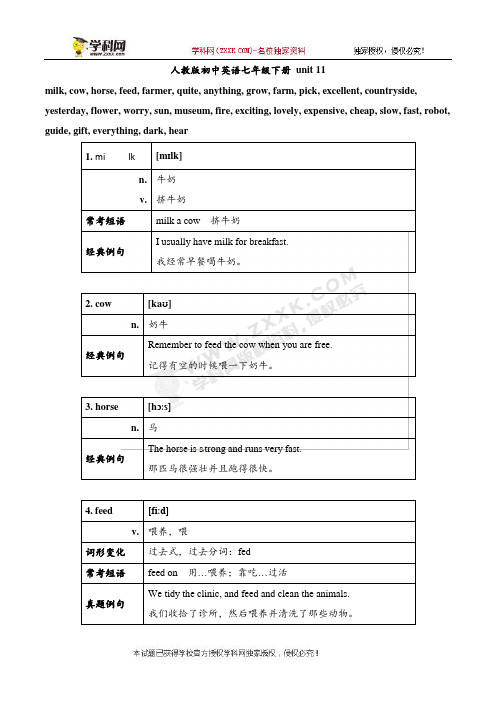
人教版初中英语七年级下册unit 11milk, cow, horse, feed, farmer, quite, anything, grow, farm, pick, excellent, countryside, yesterday, flower, worry, sun, museum, fire, exciting, lovely, expensive, cheap, slow, fast, robot, guide, gift, everything, dark, hear1. mi lk[mɪlk]n. v. 牛奶挤牛奶常考短语milk a cow 挤牛奶经典例句I usually have milk for breakfast.我经常早餐喝牛奶。
2. cow [kaʊ]n. 奶牛经典例句Remember to feed the cow when you are free.记得有空的时候喂一下奶牛。
3. horse [hɔːs]n. 马经典例句The horse is s trong and runs very fast.那匹马很强壮并且跑得很快。
4.feed [fiːd]v. 喂养,喂词形变化过去式,过去分词:fed常考短语feed on 用…喂养;靠吃…过活真题例句We tidy the clinic, and feed and clean the animals.我们收拾了诊所,然后喂养并清洗了那些动物。
5.farmer ['fɑːmə(r)]n. 农夫;农场主词形变化farm n.农场真题例句People should be grateful to a kindhearted farmer named Dan West.人们应该要对一个叫做丹﹒威斯特的好心农民心存感激。
6. quite [kwaɪt]adv. 相当,很常考短语quite a few 相当多真题例句Tom, a twelve – year – old boy, can speak English quite well.汤姆,一个12岁的男孩,能说英语说得很好。
初中英语人教新目标七年级下册Unit 3 写作预习指导(知识点+练习题)

七年级英语下册Unit 3写作预习指导一、知识点【语法】(一)how用法总结:(1)How 用来询问方式方法:用来提问到达某地的方式。
句子结构为:How + do/does + 主语 + 谓语 + 其他?Eg: -- How do you go to school?你怎么去学校?-- I go to school by bike.我骑自行车去上学。
(2)How 用来询问身体健康状况:句子结构为:How + be动词 + 主语?Eg: -- How are you?-- Fine, thank you.--你好吗?-- 我很好谢谢。
(3)How 用来询问最近过得如何:句子结构为:How + be动词/do + 主语 + going?Eg: -- How do you get on with other students?-- Very well.--你和其他学生相处怎么样?-- 非常好。
(4)How 用来询问天气情况:句子结构为:How is the weather?Eg:-- How is the weather in Beijing?= What is the weather like in Beijing?-- It’s rainy.-- 北京天气怎么样?-- 有雨。
(5)How 用来引导感叹句:句子结构为:How + 形容词/副词 + 主语 + 谓语!Eg: How fast he runs!他跑得多快啊!(二)how与形容词副词搭配提问:(1)How many “多少”;用来提问可数名词复数Eg: How many students are there in your class?你们班有多少学生?(2)How much “多少”;用来提问不可数名词数及价格Eg: How much water do you need?你需要多少水?How much are these dresses?这些连衣裙多少钱?(3)How far “多远”;用来询问距离Eg: How far is your home from your school?你家离学校多远?(4)How long “多长时间”;用来询问时间长短或物体长度Eg: How long does it take you to get to school?你花多长时间到学校?How long is the ruler?这把尺多长?(5)How often “多久一次”;用来询问频率Eg: How often do you exercise?你多久锻炼一次?(6)How soon “多久之后”;用来询问时间段Eg: How soon will you be back?你多久回来?(7)How old “多大”;用来询问年龄Eg: How old are you ?你多大了?(8)How about “怎么样”;用来提建议或咨询建议Eg: How about this one?这个怎么样?【知识讲解】1.Drive作动词时,意为“开车;推动;驱赶”常用结构:drive sb.to 地点“某人开车去某地”Eg: My father drives me to school.“我爸爸开车送我去学校。
人教版(新目标)初中英语七年级下册Unit 2
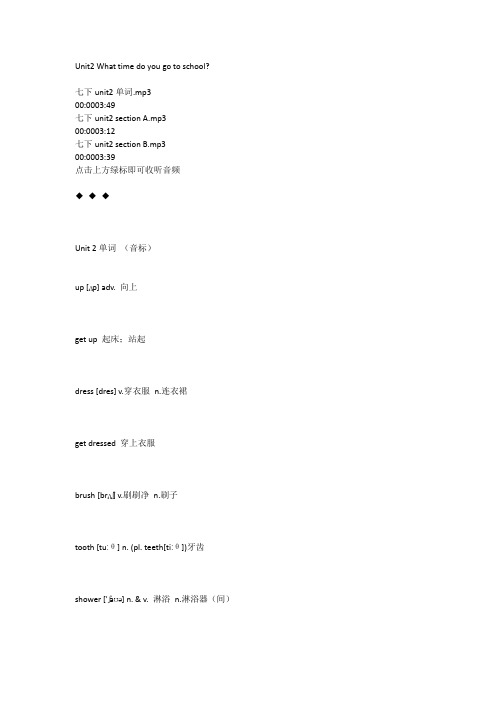
Unit2 What time do you go to school?七下unit2单词.mp300:0003:49七下unit2 section A.mp300:0003:12七下unit2 section B.mp300:0003:39点击上方绿标即可收听音频◆◆◆Unit 2单词(音标)up [ʌp] adv. 向上get up 起床;站起dress [dres] v.穿衣服n.连衣裙get dressed 穿上衣服brush [brʌʃ] v.刷刷净n.刷子tooth [tuːθ] n. (pl. teeth[tiːθ])牙齿shower ['ʃaʊə] n. & v. 淋浴n.淋浴器(间)take a shower 洗淋浴usually ['ju:ʒuəli] adv.通常地;一般地forty ['fɔ:(r)ti] num.四十wow [waʊ] interj.(表示惊奇或敬佩)哇;呀never ['nevə(r)] adv.从不;绝不early ['ɜːlɪ] adv. & adj.早(的)fifty ['fɪftɪ] num.五十job [dʒɒb], [dʒɑːb] n.工作;职业work [wɜːk] v. & n. 工作station ['steɪʃn] n.电(视)台;车站radio station 广播电台o'clock [ə'klɒk], [ə'klɑ:k] adv.(表示整点)……点钟night [naɪt] n. 晚上;夜晚funny ['fʌnɪ] adj.奇怪的;滑稽好笑的exercise ['eksəsaɪz] v. & n. 锻炼;练习on weekends (在)周末best [best] adj.最好的adv.最好地;最group [gruːp] n.组;群half [hɑːf], [hæf] n. & pron. 一半;半数past [pɑːst],[pæst] prep.晚于;过(时间)adj.过去的quarter ['kwɔː(r)tə(r)] n.一刻钟;四分之一homework['həʊmwɜː(r)k] n. 家庭作业do (one’s) homework 做作业run [rʌn] v. 跑;奔clean [kliːn] v.打扫;弄干净adj.干净的walk [wɔːk] n. & v. 行走;步行take a walk 散步;走一走quickly ['kwɪkli] adv. 很快地either ['aɪðə(r)], [ 'iːðə(r) ]adv.或者;也(用在否定词组后)either…or…要么……要么……;或者……或者……lot [lɒt], [lɑ:t] pron.大量;许多lots of 大量;许多sometimes ['sʌmtaɪmz] adv.有时taste [teɪst] v.有……的味道;品尝n.味道;滋味life [laɪf] n.生活;生命Rick [rɪk] 里克(男名)Jim [dʒɪm] 吉姆(男名)Scott [skɒt], [skɑ:t] 斯科特(男名)Tony ['təʊnɪ] 托尼(男名)unit2电子课本Unit2 知识梳理◆短语归纳1. what time 几点2. go to school 去上学3. get up 起床4. take a shower 洗淋浴5. brush teeth 刷牙6. get to 到达7. do homework 做家庭作业8. go to work 去上班9. go home 回家10. eat breakfast 吃早饭11. get dressed 穿上衣服12. get home 到家13. either…or…要么…要么…14. go to bed 上床睡觉15. in the morning/afternoon/evening 在上午/下午/晚上16. take a walk 散步17. lots of=a lot of 许多,大量18. radio station 广播电台19. at night 在晚上20. be late for=arrive late for 迟到◆用法集萃1. at + 具体时间点在几点(几分)2. eat breakfast/lunch/dinner 吃早饭/午饭/晚饭3. thirty/half past +基数词…点半4. fifteen/a quarter to +基数词差一刻到…点5. take a/an+名词从事…活动6. from…to…从…到…7. need to do sth 需要做某事◆典句必背1. —What time do you usually get up? 你通常几点钟起床?—I usually get up at six thirty. 我通常6:30起床。
初中英语人教新目标七年级下册Unit 2 默写知识练习(附参考答案)
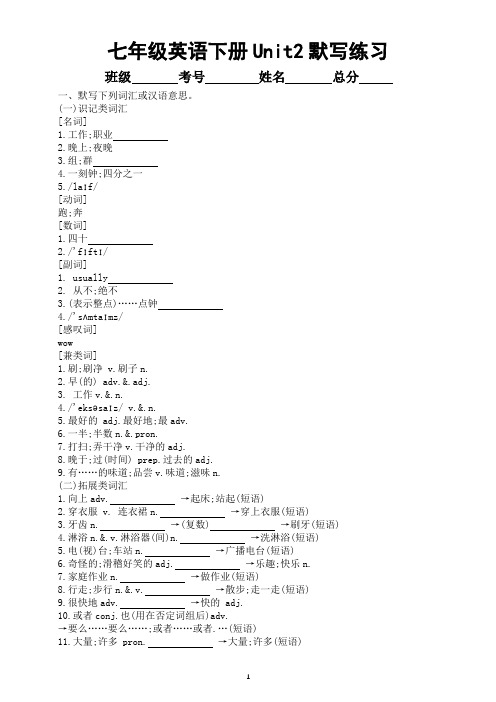
七年级英语下册Unit2默写练习班级考号姓名总分一、默写下列词汇或汉语意思。
(一)识记类词汇[名词]1.工作;职业2.晚上;夜晚3.组;群4.一刻钟;四分之一5./laɪf/[动词]跑;奔[数词]1.四十2./'fɪftɪ/[副词]1. usually2. 从不;绝不3.(表示整点)……点钟4./'sʌmtaɪmz/[感叹词]wow[兼类词]1.刷;刷净 v.刷子n.2.早(的) adv.&.adj.3. 工作v.&.n.4./'eksəsaɪz/ v.&.n.5.最好的 adj.最好地;最adv.6.一半;半数n.&.pron.7.打扫;弄干净v.干净的adj.8.晚于;过(时间) prep.过去的adj.9.有……的味道;品尝v.味道;滋味n.(二)拓展类词汇1.向上adv. →起床;站起(短语)2.穿衣服 v. 连衣裙n. →穿上衣服(短语)3.牙齿n. →(复数) →刷牙(短语)4.淋浴n.&.v.淋浴器(间)n. →洗淋浴(短语)5.电(视)台;车站n. →广播电台(短语)6.奇怪的;滑稽好笑的adj. →乐趣;快乐n.7.家庭作业n. →做作业(短语)8.行走;步行n.&.v. →散步;走一走(短语)9.很快地adv. →快的 adj.10.或者conj.也(用在否定词组后)adv.→要么……要么……;或者……或者.…(短语)11.大量;许多 pron. →大量;许多(短语)二、默写下列短语。
1.去上学2.吃早饭3.在六点半4.电台节目5.从...…到……6.在那之后7.……迟到_8.去上班9.在周末/上学日10.你最好的朋友11.起床晚12.吃晚饭13.在六点四十五分14.回家15.打扫我的房间16.快速地吃17.到家18.对……有好处19.尝起来好吃三、根据汉语提示完成下列句子。
1.“你通常什么时候洗淋浴,里克?”“我通常六点四十洗淋浴。
- 1、下载文档前请自行甄别文档内容的完整性,平台不提供额外的编辑、内容补充、找答案等附加服务。
- 2、"仅部分预览"的文档,不可在线预览部分如存在完整性等问题,可反馈申请退款(可完整预览的文档不适用该条件!)。
- 3、如文档侵犯您的权益,请联系客服反馈,我们会尽快为您处理(人工客服工作时间:9:00-18:30)。
.初中英语人教版新目标英语七年级(下)
Unit 3 How do you get to school?sectionA(2a-2e) 课例分析
一。
对教学内容的反思
(一).教材分析:本课位于七年级英语下册第单三元的第二节。
1.主要通过学习出行方式
2.掌握重点句型 1.how far is it from…to…? It’s…
2.how long does it take …to…?it takes sb some time to do
(二)学情分析:
1.出行方式比较贴近生活。
2. how far,how long 开头的句子及答语学生应用比较难,学习相对困难。
(三)教学目标:根据教材内容和学生情况确定以下几方面的教学目标。
1. 知识与技能
掌握本课的词汇和重点句型并学会应用
2.过程与方法
提高学生的听,说,读,写及培养学生运用所学知识,解决实际问题的能力。
3.情感态度与价值观能力。
使学生在人际交往中学会尊重,学会沟通,更学会交换不同的看法以增进情谊。
(四)教学重点:1本课词汇。
2. 运用主要语言结构:1.how far is it from…to…? It’s…
2.how long does it take …to…?it takes sb some time to do
(五)教学难点:运用主要语言结构: 1.how far is it from…to…? It’s…
2.how long does it take …to…?it takes sb some time to do
二、对教学过程的反思在教授这一课时,我积极倡导自主、合作、探究的学习方式,充分激发学生的主动意识和进取精神,以小组合作探究为主,学生为主体,教师为主导,以交流型课堂为特征,以激发学生的学习兴趣为为核心,以“让学生动起来,课堂活起来,效果好起来”为宗旨,对本堂课的教学进行了如下设计:
根据本课的学习内容分为自主学习,合作探究; 交流展示,精讲点拨;听力训练,能力提升;知识总结,系列训练当堂达标;教学反思。
几个部分组成
(一)、情景导入、明确目标
【预习指导】自我预习:
一、扫清障碍
根据音标读出2a---2e的单词。
二、课本预习:
熟读2a 并完成填空,复习数词
熟读并翻译2e和grammar focus
组织2d对话。
三,预习效果检查。
1,写出基数词1----21
2,写出20------100(整十)
3,写出并读出下列单词或短语
分钟千米,公里每天新的,刚出现
骑自行车多远多久一百祝你玩得愉快
我不很肯定
【课内学习】
一、教材处理:
1.检查2a 的预习效果
2.放录音让学生跟读。
3..听录音完成2b。
运用2d中的三个句型,朗读听力材料
4学生学习并熟读2e对话,然后两人一组自编对话。
5展示成果,小组对话表演。
(二)、自主学习,合作探究
How do you get to school ?怎样用英语回答。
How long does it take you to --- ?在回答时要注意什么?How far is it from ---to ?怎样用英语回答
(三)拓展延伸,精讲点拨
1. It takes me about half an hour to g How do you get to school ?怎样用英语回答。
How long does it take you to --- ?在回答时要注意什么?How far is it from ---to ?怎样用英语回答
It takes sb. some time to do sth. 花费某人时间做某事。
It takes me two hours to do my homework.
How long does it take you to go to school on foot every day?
2. How far is it from your home to your school?
It’s three miles away from my school.
3.by bike 骑自行车=ride a bike to…例如My mother often goes to work by bike.
同义句My mother often rides a bike to work. 或My mother often rides to work.
4be far (away) from 离……远,例如:The bus station is very far (away) from here,
(五)总结反思
(六)当堂检测
(七).教学反思
在教授这一课时,我积极倡导自主合作,探究的学习方式,充分激发学生的主动意识和进去精神。
但是在学案的应用过程中,如何展示和检测处理上不清楚,学生口语表达不清,交际应用练习较多,占据时间多,本课容量较大,角色表演分配时间较少,知识点的分析较少,所以以后要注意各环节的时间分配问题,掌握好课堂节奏。
三、片段分析
片段一
第一次课预习采用课前预习,课上书写检测的方式,占用时间较多,检查的不充分。
经过同组老师的指导和讨论。
第二次课我采用的是课前预习,课前书写,课上小组合作汇报预习效果,利用多媒体课件采用头脑风暴的方式,预习基数词,每个同学都参与展示。
片段二
第一次课,语言输入我采用课件展示,学生说练,层次不够清晰,语言输出练习的少。
经过组内老师的讨论和自我修改。
第二次课对课件进行了修改,有输入输出的过程,层次明朗。
四、“我的模式我的课”今后努力的方向
结合本节课的教学内容、教学过程和教学效果的反思,在今后的教学中要注意以下几方面:
1、备好课。
备课不是简单的将知识罗列或记忆,要遵循“充分整合教材、合理挖掘教材、有效拓展教材”的方针处理教材,不仅备教材,还要备学生,并预设教学中可能会出现的各种问题及解决方法。
2、充分发挥学生的主体地位。
不要老是老师在上面不停地讲,‘填鸭式’教学,要充分调动学生学习的积极性和主动性,让学生参与到课堂教学中来,多对话,多表演,变要我学为我要学。
3、充分发挥评价对学生的激励作用,在授课过程中不同的学生给以不同程度的题,然后给予表扬,从而调动全体学生的积极性,使学生愿学。
4、做好预习导学,预习导学是导学案教学中极其重要的一个环节,它既能充分体现学案的导学功能,又是实现全体先行的关键环节为学生提供了一种适合学情的,有针对性的课前预习也是一节课成功的关键。
总之,教学工作是一项认真细致和需要耐心的工作,不能有半点马虎和敷衍。
同时教学工作不仅要教给学生知识,还要培养学生学习的习惯和学习的能力。
只有充分发挥教师的才智才有可能胜任这份工作,希望我能在今后的工作中做的更好。
